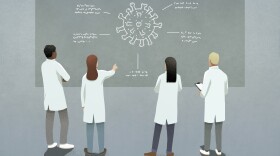
Anya Kamenetz
Anya Kamenetz is an education correspondent at NPR. She joined NPR in 2014, working as part of a new initiative to coordinate on-air and online coverage of learning. Since then the NPR Ed team has won a 2017 Edward R. Murrow Award for Innovation, and a 2015 National Award for Education Reporting for the multimedia national collaboration, the Grad Rates project.
Kamenetz is the author of several books. Her latest is The Art of Screen Time: How Your Family Can Balance Digital Media and Real Life (PublicAffairs, 2018). Her previous books touched on student loans, innovations to address cost, quality, and access in higher education, and issues of assessment and excellence: Generation Debt; DIY U: Edupunks, Edupreneurs, and the Coming Transformation of Higher Education, and The Test.
Kamenetz covered technology, innovation, sustainability, and social entrepreneurship for five years as a staff writer for Fast Company magazine. She's contributed to The New York Times, The Washington Post, New York Magazine and Slate, and appeared in documentaries shown on PBS and CNN.
-
The National Academy of Sciences report includes an updated review of the evidence from around the world and a set of recommendations on mitigation strategies for the coronavirus in school settings.
-
The districts cite "skyrocketing infection rates" in the coronavirus pandemic in Southern California.
-
In a new statement made jointly with teachers unions, the American Academy of Pediatrics now says "science and community circumstances must guide decision-making."
-
Teachers, parents and district leaders say the back-to-school season has fogged over with confusion. Will schools reopen? And if so, how?
-
The dangers of social isolation outweigh the risks of in-person classes for most children, says the American Academy of Pediatrics.
-
The Y, and New York City's Department of Education, have been caring for tens of thousands of children during the pandemic. Neither has had reports of coronavirus clusters or outbreaks.
-
In most states, Black students are more likely to be arrested at school, and according to one expert, "There isn't much evidence indicating that police officers in schools make schools safer."
-
American education is full of innovators practicing alternatives to the mainstream. Now, some of those alternatives are proving their mettle.
-
The legal cases argue that online classes don't have the same value as on-campus ones.
-
Parents from low-income homes are twice as likely to say remote learning is going poorly or very poorly, and 1 in 3 of all parents say they are "very concerned" about children falling behind.










